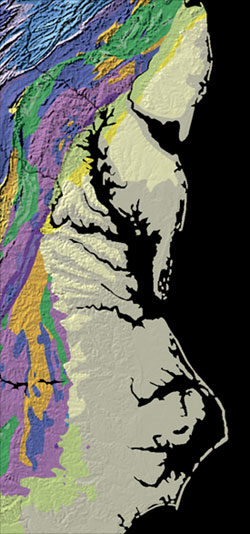Glen
Moderator

A fall line is the site between an upland region of continental bedrock and an alluvial coastal plain. A fall line is particularly important where a river crosses it, as this is often the point where a river can't be navigated due to the presence of rapids or falls. In the early industrial age, this point on a river was also important as it often provided the ideal location for water-wheel driven mills and factories. The two factors combined made for the almost guaranteed growth of towns and even cities where rivers crossed a fall line along the east coast of North America.
Cities and Towns along the Piedmont – Coastal Plain fall line in the United States of America and British Southern America include, from north to south:
United States of America:
- New Brunswick, New Jersey on the Raritan River
- Trenton, New Jersey on the Delaware River
- Philadelphia, Pennsylvania on the Schuylkill River
- Wilmington, Delaware on the Brandywine Creek
- Newark, Delaware on the Christina River
- Conowingo, Maryland on the Susquehanna River
- Baltimore, Maryland on the Patapsco River
- Laurel Factory, Maryland on the Patuxent River
- Georgetown on the Potomac River
- Occoquan, Virginia on the Occoquan River
- Fredericksburg, Virginia on the Rappahannock River
- Richmond, Virginia on the James River
- Petersburg, Virginia on the Appomattox River
- Roanoke Rapids, North Carolina on the Roanoke River
- Johnston County Courthouse, North Carolina on the Neuse River
- Cornwallis, North Carolina on the Cape Fear River
- Chatham, South Carolina on the Pee Dee River
- Camden, South Carolina on the Wateree River
- Congarees, South Carolina on the Congaree River
- Augusta, Georgia on the Savannah River
- Wrightville, Georgia on the Oconee River
- Oldfield, Georgia on the Ocmulgee River
- Brocktown, Georgia on the Chattahoochee River
- Talisi, Indiana on the Tallapoosa River
- Wetumpka, Indiana on the Coosa River

